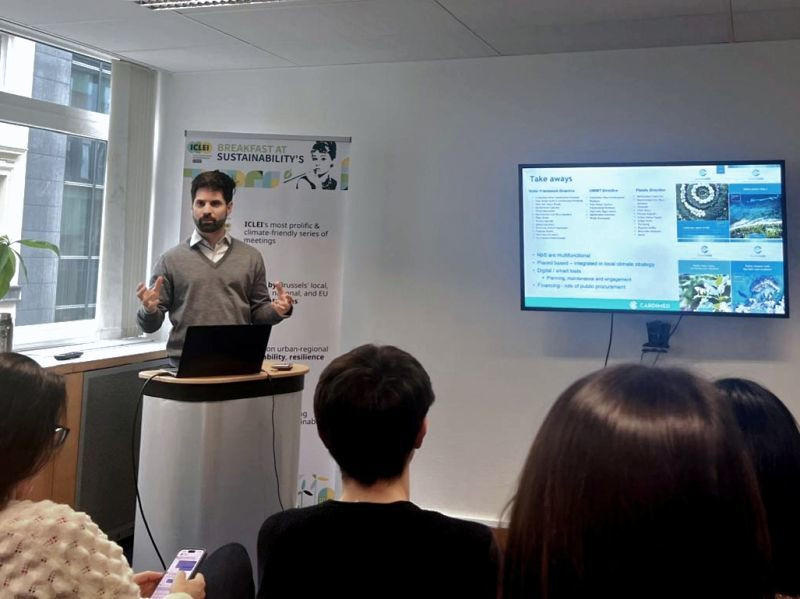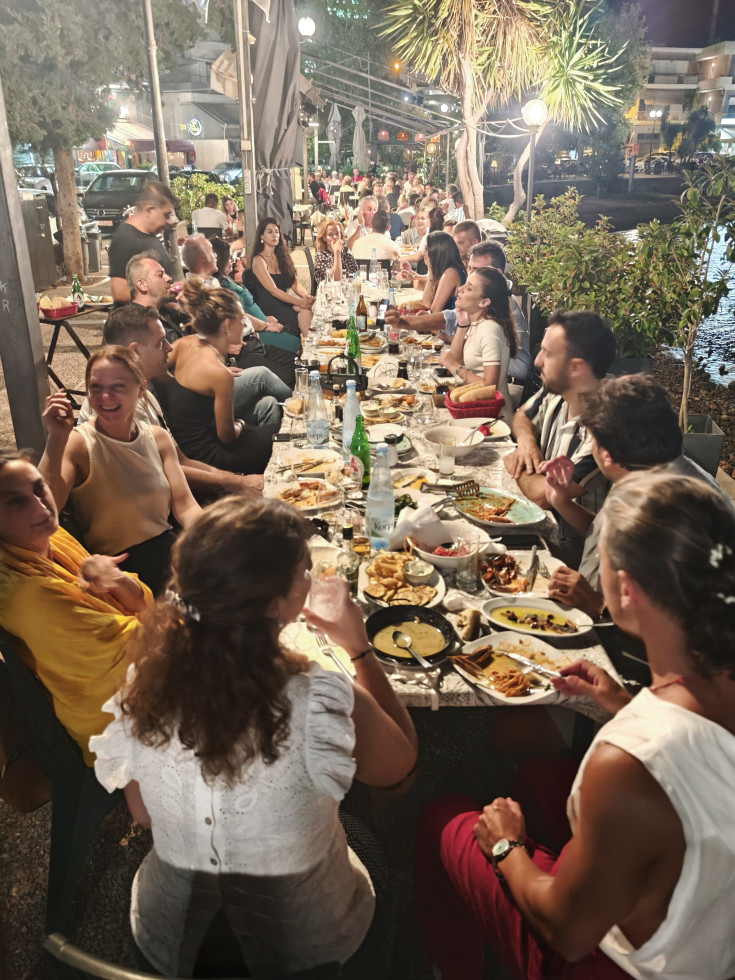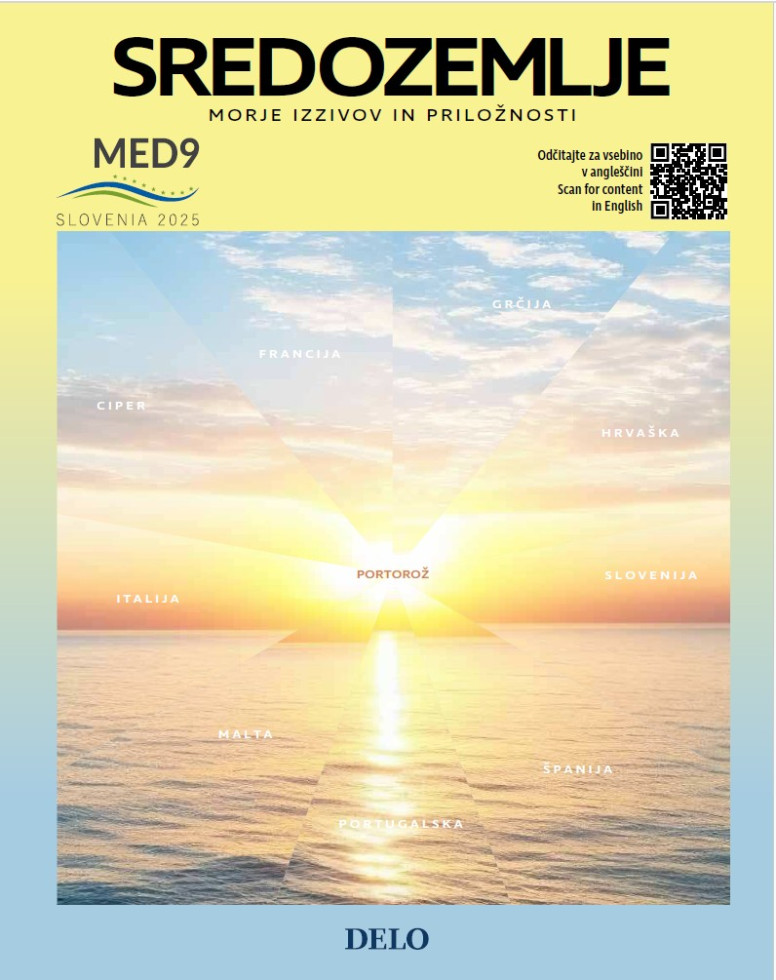In charge of water management in a land of contrasts and hot passions
"I was lured to Greece by love, I moved to Athens because of my then-girlfriend, and now-wife, Alexia. I completed my doctoral studies in the field of cavitation at the Ljubljana Faculty of Mechanical Engineering under the mentorship of Professor Matevž Dular. During my studies, I collaborated in a joint project of an international society with Alexia, who moved to Slovenia and we lived together for two years. She didn't get a real business opportunity here, but received much better job offers from Greece, so she returned to Athens, and I followed her after getting my doctor0s degree. I went there somewhat frivolously, believing that I would find a suitable job without much difficulty. I was taking it easy for the first few months, but then I actively started looking for work and, after a good six months. I got a job at an international company, where I only stayed for a short time. I have been employed at the National Technical University of Athens for five years now. I work in the field of climate change adaptation at the Faculty of Civil Engineering, mainly dealing with water management," said the 37-year-old doctor of mechanical engineering.
There is a problem with water although Greece is rich in water resources
He moved to a country where water supply is a serious challenge in the summer. At this time of year, when there is almost no precipitation, the country is also exposed to the risk of wildfires. Water supply is a serious challenge. "Climate change is much more evident in Greece than elsewhere in Europe, including in Slovenia. In summer, temperatures exceed 40 degrees Celsius, and it rains increasingly less often, so that proper water management is extremely important. Before coming to Greece, I worked on wastewater treatment technology in Ljubljana, where mechanical engineers collaborated with chemists, pharmacists, and biologists in developing wastewater treatment devices. This what I am doing also in my laboratory now, with the scope of work expanding further, as here we look at water management more comprehensively, not just from the perspective of water treatment and reuse technology. This is also about efficient use, as well as social and economic aspects. If we consider only hot summers, when agriculture and tourism are the main consumers of water, we are looking for answers to the questions of how to satisfy the enormously increased water needs in all economic sectors, while there is a severe shortage of rainfall. We are also considering the ways of regulating water management concessions, the ways of fairly regulating payments, and the like," explains Stepišnik Perdih.
For the time being, Athens is currently well supplied with water, mainly due to four larger reservoirs situated in the mountains 250 kilometres away from the city.
"Mainland Greece has a considerable number of water resources given the fact that 80 percent of its territory are mountains. For the time being, Athens is currently well supplied with water, mainly due to four larger reservoirs situated in the mountains 250 kilometres away from the city. The Athens' public utility company has recently boasted that it had sufficient supplies for the city for a four-year period if there was no rain. But since last year, warnings about reasonable water consumption have become louder, and more efforts are being made to raise public awareness. Many islands are supplied with fresh water by ship, and there is a growing number of seawater desalination plants, but wastewater treatment and reuse, and, in my opinion, the most sustainable are nature-based solutions. There's not much of it at the moment, but it's being developed for the future," says Tadej Stepišnik Perdih, who is one of the few foreigners at the aforementioned Athens University.
He and his colleagues are involved in international research projects, the largest of them being the Horizon Europe Programme, which has been devised by the European Union for the purpose of research and innovation in the period 2021–2027, and is worth as much as EUR 95.5 billion. "The European Union encourages cross-border cooperation and the exchange of knowledge and good practices. Similar problems are also being addressed in Malta, Spain and Croatia. We monitor the work of innovative startups, good practices in other countries where the problems are of a different nature, but can help us find solutions," explains Tadej.
Poor traffic culture and waste treatment
He feels at home in business, and it seems that he has quickly adopted the habits of life in a diverse and vibrant metropolis with a population of nearly four million. "To put it simply, Greece is a country of contrasts, it is a relatively large country with big problems, completely different from Slovenia, which is a small country with small problems. There are many things that are really good in Greece, but there are also many things that are problematic, which also applies to Athens. The first such thing is traffic culture. Drivers are reckless and their traffic culture is rock-bottom. They do not observe speed limits, safe distance, they mainly do not watch out for and give way to pedestrians and cyclists, they do not look out for the weaker in traffic. Even on major roads into the city, they would simply stop right on the carriageway, jump in for a coffee, and cause traffic jams. Pavements are generally narrow, often impassable due to various obstacles, densely put up traffic signs, and various barriers. This is what goes on my nerves. To my mind, another problem is the Greeks' attitude towards the natural environment. People often throw pieces of paper or cigarette butts through a house or car window into the street. The country has a beautiful nature and viewing points, but they are often littered. There is still a lot to be done about it. Waste separation is formally organised, but one mainly sees waste bins with three openings for different types of waste, but with a single plastic bag underneath. The questions is then how waste is processed. Things are changing slowly", critically observes the nature lover native of Šmarje pri Jelšah.
All of the above does not however prevail when rating the quality of life in the Hellenic Republic. "Greece has wonderful weather as well as nature stretching from the mainland to the islands. I really enjoy this, as well as the Greek customs of taking time for food and socialising with family, relatives and friends," he speaks highly of the notorious Greek mentality.
Food is part of social life
"In Athens, it is a highly appreciated fact that not all neighbourhoods are burdened by tourism and modern consumerism. They have preserved their authenticity and local communities are being strengthened. This is particularly reflected in small private shops that are also an important social hub. They serve as points for strengthening social cohesion, which includes various craftspersons – plumbers, carpenters, dressmakers or electricians, I like it that they have preserved the feeling of homeliness. I take all my visitors to local markets. These are makeshift, itinerant markets that open in individual parts of the city one day a week. A street is then closed for traffic and stands with fruit and vegetables, cheeses, eggs, honey are put up and all their wares are sold by the afternoon. These markets are extremely popular among Greeks as they allow people to save money and to establish personal relationships with the sellers, agricultural producers. The standard of living is lower, while prices are often even higher than in Slovenia. Fruit and vegetables sold at the aforementioned markets are cheap, prices in stores are generally similar or slightly higher, but many services are generally more expensive than in Slovenia, including mobile telephony and the Internet. For the average Greek, life is expensive, particularly in Athens and Thessaloniki, where I've been living temporarily for the past year," adds the young father, who moved with Alexia and daughter Eva closer to his wife's parents' place in the suburbs of Thessaloniki where the grandparents will help them with child care.
In Greece there many civil society rallies. People are very much engaged in socio-political events, they are very proactive.
In Greece's second largest city, which, together with its suburbs, has a population of about one million, Tadej also enjoys home cooking surrounded by his extended family. "I can confirm that the staple of the Greek diet is meat, although I have never eaten so much seafood in my life as I have in recent years. I like both foods, I am not overly picky. I also eat much more legumes here than in Slovenia, as they are regularly prepared at home, not so much in restaurants. Lentils, chickpeas, and various kinds of beans are part of daily menus. Individual regions are very proud of their produce, which is very popular throughout the country. The city of Florina is famous for its peppers, eggplants from Leonidio are highly sought-after, and the lentils from Lefkada, an island off Greece's west coast, have earned a well-deserved reputation. In short, each region has a nutritional asset of its own. This diversity contributes to the proverbial leisurely nature of Greeks, who spend a lot of time eating and lively discussing current affairs during meals. It doesn't have to be a big feast, they also enjoy mezes or snacks on small plates, and often sip on tsipouro, a brandy similar to ouzo," Tadej ends with a picturesque description while sitting down with us down at a table laden with Greek delicacies.
Even more than about food, he is enthusiastic about sports, especially the basketball tradition of Greece and Athens. "As a big basketball fan, I enjoy Panathinaikos and Olympiacos games. Imagine the privilege of being able to regularly watch the matches between the two basketball giants in the elite Euroleague and the Greek championship in a single city. A I am fan of PAO, also because of our Slovenian teams that have made a strong impression here in recent years. Sani Bečirović was sports director of Panathinaikos, a club whose team also included Andraž Šporar, Benjamin Verbič and Adam Gnezda Čerin from Slovenia. Well, only Adam has remained now", explains the green Athenian team's fan from Slovenia.
Greeks do not only passionately follow their favourite sports teams, they also respond similarly or even more passionately to political events, various social problems, scandals, irregularities of all kinds, all with mass protests and demonstrations that are part of everyday life. "There are many civil society organisations' rallies in Greece. People are very much engaged in socio-political events, they are very proactive. I admire them when they take to the streets when want their voices to be heard on political issues, corruption, scandals, or the deteriorating financial situation of a certain population group. They demand accountability from politicians, authorities or competent institutions. These are mostly peaceful, not violent protests. Greek people also have a rich cultural life with many festivals and concerts carrying a political message, organised to protest against racism or demand addressing the situation in a certain area. There are many small independent theatres that use their performances to draw attention to injustices and irregularities in society. The student population is also very active with numerous movements, and there are many independent newspapers and online portals that are critical of the controversial leadership of the country or various irregularities," went on Tadej.
We have founded a Slovenia-Greece Friendship Association. According to a rough estimate, there are approximately 200 Slovenians living in Greece, scattered throughout the country, most of them on the islands.
Apparently, the creative and critical social climate in the Mediterranean motivated him to undertake another project on Greek soil: "We have founded a Slovenia-Greece Friendship Association. According to a rough estimate, there are approximately 200 Slovenians living in Greece, scattered throughout the country, most of them on the islands. The association's main purpose is connecting its members, organising activities aimed at preserving the culture and the language, and organising sports events. At the beginning of October, we had our first mountain hike, and in the future we will draw up a comprehensive programme of our activities. We enjoy support from the Embassy of the Republic of Slovenia and out first joint project will be to set up a Slovenian library. With the help of the Slovenian Book Agency, we have collected about 150 books, which will be available at the Embassy and the Society's headquarters in Thessaloniki. We want the Slovenian community in Greece to be connected and active in various fields," concludes the president of the Slovenia-Greece Friendship Association.





